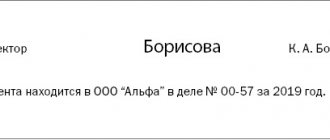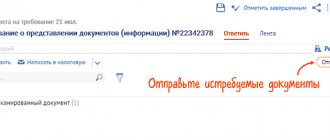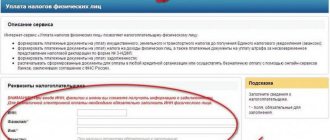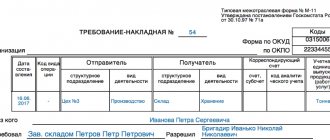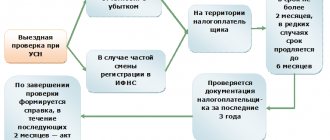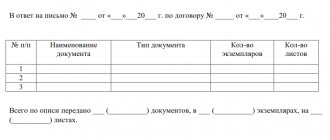Rules for making copies of documents
A copy is a complete and accurate reproduction of the contents of a document, prepared in accordance with established procedures and rules, on a hard (usually paper) basis or in electronic form.
Title of the document; 2)
text (actually a copy of the document, exactly reproducing its contents); 3)
General requirements for the preparation of copies of documents are determined by the State Educational Institution. In particular, in accordance with sub. 2.3.2.5 State SDOU enterprise (organization, institution) can issue copies only of those documents that are created in the enterprise itself (this provision, however, does not apply to archival institutions and notaries. - Author).
When deciding, in accordance with the legislation of the Russian Federation, cases relating to the admission of citizens to work or study, the satisfaction of their labor (housing and other) rights, as well as for the purpose of forming their personal files, an enterprise can make copies of documents issued by other enterprises (organizations, institutions) and necessary to resolve relevant issues (copies of diplomas, certificates of education, etc.). When making copies of documents relating to the rights and interests of citizens, a note is made on the document from which the copy was made about who and when it was issued, and on the copy itself a note is made that the original is stored at this enterprise.
A copy of a document is reproduced by handwritten or typewritten methods, or by means of operational printing (including computer printing).
When making a copy by handwritten and typewritten methods, the text of the document is retyped in full, including the elements of the form (using symbols - “organization seal imprint”, etc. - Author).
The copy must be certified by an official who certifies its full compliance with the original, for example:
HR Department Inspector signature L. S. Petrov 11/25/2004
Certification of a copy of a document (including notarization) is carried out to give it legal force. On copies of outgoing documents remaining in the file, it is allowed not to indicate the date of certification and the position of the person who certified the copy. When sending a copy of a document to other enterprises or handing it over, the certification signature must also be certified by a seal.
In particular, in accordance with the requirements of the Standard Instructions for Office Work (paragraph 4.1.4), copies of orders (instructions) or their duplicated copies are certified with the seal of the preschool educational institution service, and then sent to the recipients in accordance with the mailing index, which is drawn up and signed by the executor.
20.2. Requirements for preparing extracts from documents
An extract is an exact reproduction of a fragment of the contents of a document on a solid (usually paper) basis, drawn up in accordance with the established procedure and rules.
An extract is issued in cases where, for one reason or another, making a copy of a document seems impossible (for example, due to the confidentiality of the information contained in the document) or impractical (for example, due to the significant volume of content of the document).
In fact, the extract functions as a copy of the document. Considering that in the unified regulations on documentation support (GOST R6.
30-2003, GSDOU, Standard Instructions for Office Work) requirements for the preparation of extracts are not defined, it seems permissible to prepare them in compliance with the basic requirements for copies of the listed documents (see above).
The requirements for the preparation of extracts are specified in a number of departmental regulations and organizational and administrative documents93. The extract details are: 1)
Title of the document; 2)
title to the text (indicates the source document, formulated in the genitive case - “from.”); 3)
text (actually an extract from the document, exactly reproducing its fragment); 4)
An approximate form of an extract from the work book94 is given in Appendix 58. An approximate form of an extract from the charter of a legal entity95 is given in Appendix 59.
Recommendations for the design of individual elements of document content are presented in Appendix 60.
How to certify copies of documents according to the new GOST from July 1, 2021
Copying documents is a common procedure for any person. But a copy acquires legally significant status only after it has been properly certified. What is the procedure for requesting and processing copies, and what changes in this process from July 1, we will tell you in our material.
Why are copies needed and how to get them
Any citizen may need certain copies of documents from their place of work. For example, banks may request a copy of the work record when issuing a loan, or new employers when registering employees on external part-time basis.
What to do if you were asked for a copy of your work record or you need a certified duplicate of another personnel document? The algorithm of actions is simple, but certain rules established by law still exist:
Rule 1. Contact your employer with a written statement
This will be the starting mechanism for obtaining a copy. You, of course, can contact HR specialists with a verbal request in this regard, but most likely you will receive a refusal. You will still have to write a statement. The reason for this is Art. 62 of the Labor Code of the Russian Federation, which includes the phrase “upon a written application from the employee...”.
What to write in the application and in what form? There are no special rules here. You can type the text on a computer or fill out the application in the old proven way, writing it by hand on a piece of paper.
Just one piece of advice: the style of presenting your request should be business-like, and the text structure should correspond to the official document. This means that in the header of the application you need to indicate whose name the application is being submitted, then state the request, and complete the application with a personal signature with a transcript and date.
General Director of Meteor LLC
Savelyev Petr Nikolaevich
from a plumber in a machine shop
Vasiliev Anatoly Konstantinovich
Based on Art. 62 of the Labor Code of the Russian Federation, I ask you to provide me with duly certified copies of:
2. Order for employment.
Vasiliev / Vasiliev Anatoly Konstantinovich / 06/29/2021
Rule 2. Be patient ─ three-day delay
You should not immediately demand ready-made copies after writing the application. According to Art. 62 of the Labor Code of the Russian Federation, the employer has three days to fulfill your request. He cannot refuse you, but he also does not have the obligation to immediately provide the requested duplicates by law.
So be patient and wait. Perhaps this process will not take long, and you will receive your treasured copies on the same or the next day.
Rule 3. Having received copies, check that they are certified correctly
This is perhaps the most important rule for everyone, if you don’t want to run to the HR department several times and ask to re-issue incorrectly certified copies. At the place where duplicates are provided, they may not be accepted precisely because they are incorrectly certified.
And here, be careful. From July 1, 2021, the rules for certifying copies of documents have been adjusted. What has changed?
You need to carefully check the inscription on the copy made by the responsible person of the employer. It should contain:
- The inscription "True".
- Position, signature of the responsible person and its transcript.
- Certification date.
- Indication of the storage location of the original document from which the copy was made.
Source: //agentsovetnik.ru/pravilo-oformlenija-kopij-dokumentov/
How to certify documents for court
In practice, quite often you have to deal with copies of documents: make them at the request of employees, contractors, for government agencies, etc. In addition, sometimes the legal entity or individual entrepreneur, for some reason, retains copies of documents, and not the originals.
In this article we consider questions about the proper execution of copies of documents and their legal force.
Copies of documents…
...to the employees. In accordance with Art. 62 of the Labor Code of the Russian Federation, upon a written application from an employee, the employer is obliged no later than three working days from the date of its submission to issue copies of documents related to work.
We are talking about documents such as, for example, copies of orders for employment, transfers to another job, dismissal from work, extracts from the work book, salary certificates, accrued and actually paid insurance contributions for compulsory pension insurance, period of work with this employer, etc.
According to the Decree of the Presidium of the USSR Armed Forces dated 04.08.
1983 N 9779-X “On the procedure for issuing and certification by enterprises, institutions and organizations of copies of documents relating to the rights of citizens” (hereinafter referred to as Decree of the Presidium of the USSR Armed Forces N 9779-X) state and public enterprises, institutions and organizations issue copies of documents upon applications from citizens, emanating from these enterprises, institutions and organizations, if such copies are necessary to resolve issues relating to the rights and legitimate interests of citizens who contact them.
Effective as amended on December 8, 2003.
Copies of documents are issued on the letterhead of enterprises, institutions and organizations. In the same manner, organizations can issue copies of documents they have that come from other organizations from which it is difficult or impossible to directly obtain copies of these documents.
In cases where documents were executed on forms, the details of the forms are reproduced when making copies.
Moreover, enterprises also send copies of documents they have at the request of other enterprises, if they are necessary to resolve issues relating to the rights and legitimate interests of citizens who contact them.
In addition, the Labor Code of the Russian Federation stipulates that copies of work-related documents must be properly certified and provided to the employee free of charge .
According to the provisions of Decree of the Presidium of the USSR Armed Forces N 9779-X, the accuracy of the copy of the document is certified by the signature of the head or authorized official and the seal. The date of issue is indicated on the copy and a note is made that the original document is located at this enterprise.
Enterprises, institutions and organizations are required to certify the accuracy of copies of documents, if the legislation does not provide for the provision of copies of such documents certified by a notary.
Note!
How to certify copies for the court in general
Copies of documents with unclear text, erasures, additions and other unspecified corrections are not subject to certification.
If these provisions are violated, the employer may be held liable. Article 5.27 of the Code of Administrative Offenses of the Russian Federation provides that violation of labor and labor protection legislation entails an administrative fine:
- for officials - in the amount of 1000 to 5000 rubles;
- for persons carrying out entrepreneurial activities without forming a legal entity - from 1000 to 5000 rubles. or administrative suspension of activities for up to 90 days;
- for legal entities - from 30,000 to 50,000 rubles. or administrative suspension of activities for up to 90 days.
Repeated commission of this offense by an official entails disqualification for a period of one to three years. Therefore, the issue of issuing copies of documents related to the work activities of employees is very serious.
...to contractors and other interested parties. However, it is important to note that the above rules apply only to copies of documents affecting the rights of citizens. Those documents that are exclusively commercial in nature may be drawn up in a different way.
For your information. A copy of a document is a document that completely reproduces the information of the original document and all its external features or part of them, and has no legal force.
Certified copy of the document
Source: //gragdanskii-advokat.ru/kak-zaverjat-dokumenty-dlja-suda/
So what is the most convenient way to provide the tax inspector with access to documents?
We recommend providing the inspector with a separate computer on which document viewing tools and CIPF will be installed.
To view formalized documents and information about electronic signatures, we recommend using the web client of the EDF operator, through which the exchange with counterparties was carried out. Of course, there is a risk that the inspector may see other documents that are not relevant to the inspection. In this case, you can contact the EDF operator and ask whether it is technically possible to provide access to documents previously specified in the organization. Electronic document management in companies is far from uncommon today. An increasing number of organizations are faced with electronic requirements to submit documents to the tax office. Among the main advantages of electronic submission of documents, it is worth highlighting the simplification and reduction of time for generating a set of required documents, as well as a reduction in the time of the audit itself by the tax inspectorate. Yes, all this applies to a desk tax audit. The practice of conducting an on-site tax audit during EDI in organizations today is extremely small. "And good!" - the accountants will say. The legislative basis for the GNP procedure is just being created, so listen to the recommendations of experts. And let the GNP bypass you.
